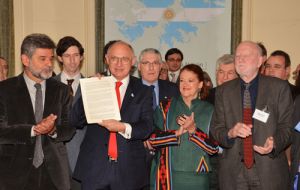MercoPress. South Atlantic News Agency
Europe Pro-dialogue groups side with Argentina; call for Falklands’ sovereignty discussions
 Richard Gott, is a former Latinamerican affairs correspondent for The Guardian and heads the Group’s UK Chapter
Richard Gott, is a former Latinamerican affairs correspondent for The Guardian and heads the Group’s UK Chapter European personalities from politics, culture and academia meeting in London for a two-day event expressed their support for Argentina’s claim over the Falklands/Malvinas Islands and signed a declaration calling on the UK to resume discussions for a peaceful and definitive solution to the ongoing dispute.
Headed by Foreign minister Hector Timerman and ambassador Alicia Castro, the event at the Argentine embassy took off on Wednesday with the attendance of 42 members from the so-called 18 European Groups Pro Dialogue in the Malvinas Question.
The spirit of the meeting clearly oriented towards the Argentine position nevertheless acknowledged that Argentina and UK are both members of the UN, democracies, with a long tradition of friendship and cooperation, plus the fact that “they now coincide as members of the UN Security Council”
The day started with a draft presentation of the declaration which was read by British writer Richard Gott, a former Latinamerican affairs correspondent for The Guardian and who heads the Group’s UK Chapter.
The document recalls that the Falklands/Malvinas controversy dates back to 1833 when “Great Britain usurped the Islands from Argentina” and later evolved with the UN 1965 resolution in which by an overwhelming vote it was decided that “both countries should find a peaceful solution” to the dispute.
Further on the draft states that the Malvinas Islands are seen by Argentina and the Latinamerican region as a ‘colonial enclave’ besides the fact that from 1965 until 1982, --when the Argentine military invasion--, there were sovereignty negotiations between London and Buenos Aires, including the possible transfer of the Malvinas Islands and a possible joint administration.
Likewise the declaration argues that Latinamerica is a zone of peace and the British military escalade is “a matter of concern for all the countries in the region”.
Furthermore the UK continues with unilateral activities in the disputed area of the South Atlantic, exploration and exploitation of renewable and non renewable natural resources in clear contravention of UN resolutions. It adds that “this includes the growing militarization of the zone by the UK which has converted the Malvinas Islands in one of the most militarized areas of the planet”.
The document also points out that when Argentina lost the war in 1982 and the military government collapsed the democratic governments that followed have unanimously rejected war to recover the Islands. This was enshrined in the 1994 constitution saying that the sovereignty dispute must be resolved in a peaceful way respecting the interests of the inhabitants of the Islands.
And since the return of democracy in December 1983, Argentina is no longer a menace for the UK of the Malvinas Islands. In continental Argentina lives a great community of British descendents perfectly integrated and Argentina has reiterated its commitment to dialogue and the UN continues to call on both sides to resume negotiations. All indicates that the UK should re-establish the pre-1982 dialogue.
“But the British government refuses to dialogue”.
Finally the representatives of the 18 European Pro-Dialogue Group calls for dialogue and to show the world their commitment to peace and respect for International law.
The document is signed by lawyers, politicians, journalists and academics from Germany, Austria, Belgium, Bulgaria, Denmark, Spain, France, Greece, Hungary, Italy, Ireland, Netherlands, Poland, Portugal, Czech Republic, UK, Romania and Sweden.
Among the distinguished personalities figure UK’s Jeremy Corbyn and Richard Gott; International Law jurist Sophie Thonon from France; Irish Senator Terry Leyden and Dutch Senator Theo Van Boven.





Top Comments
Disclaimer & comment rules-

-

-

Read all commentsI stopped reading the article after this bit...
Feb 07th, 2013 - 09:15 am 0'The document recalls that the Falklands/Malvinas controversy dates back to 1833 when “Great Britain usurped the Islands from Argentina”'
What a load of rubbish, they can't even get the facts right. I'm pretty sure the document would have been written out weeks ago in Argentina, then rubberstamped by morons like Richard Gott.
Ok….
Feb 07th, 2013 - 09:21 am 01 “But the British government refuses to dialogue”.
Not true. We agreed to meet to discuss bi lateral issues with you with the exception of the Falklands which we advised they Islands recognised legislative government needed to be present. Argentina refused to meet us which was clearly captured in news articles all over the globe.
2 Likewise the declaration argues that Latinamerica is a zone of peace and the British military escalade is “a matter of concern for all the countries in the region”.
We have a presence in our territory namely the Falklands simply because of the historic acts and on-going military posturing of Argentina. Let us not forget the comments made recently from a senior member in Argentina’s military stating the only thing stopping an invasion (apart form the fact the military effort in Argentina is either sinking or woefully behind the times) was the British presence on the islands. Further to this is brazils etc growth of their armed and naval presences not also a militarisation of the region?
3 with the attendance of 42 members from the so-called 18 European Groups Pro Dialogue in the Malvinas Question.
I respect their people’s views. They are entitled to them in a free and democratic country. But they are a minority and do not speak for most people as has been shown in many, many surveys, governmental talks etc. Please note that not a single senior politician, Leader of a country etc from the EU was present or has stated there agreement.
What will it take for Argintia and the rest of LA to realise that the Islands are not up for negotiation unless (and in the very unlikly event) the islanders ask for it to be. Instead I would ask these countiress and Argintina especialy to focus in on their country, their ecanomic issues and ongoing poverty / humanitarion issues at home. Sort that out first then come back to the table to ask for trilateral talks towards these self goverend overseas territories.
Self determination for the Falkl
Out of half a billion people in Europe- twitman got 42 to come and sign?----Wow!!!!!!!!!!!!!!!!!!!!!!!!!!!!!!!!!!!!!!!!!
Feb 07th, 2013 - 09:26 am 0Commenting for this story is now closed.
If you have a Facebook account, become a fan and comment on our Facebook Page!